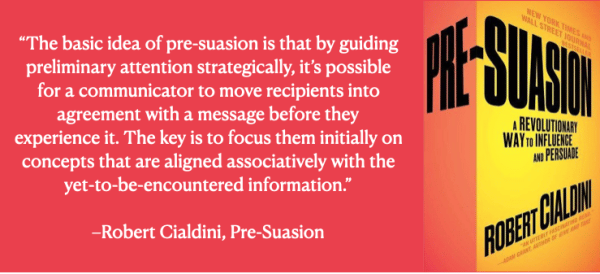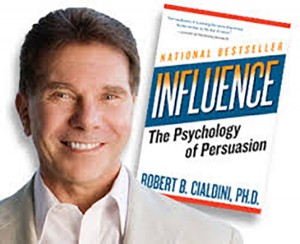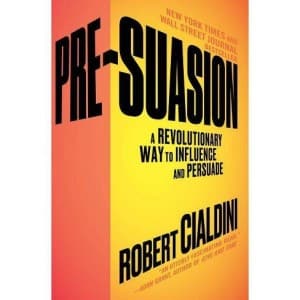
What’s a “Privileged Moment”?
That’s a term coined by Dr. Robert Cialdini.
 And before I let him explain Privileged Moments, here’s a short intro.
And before I let him explain Privileged Moments, here’s a short intro.
Cialdini is a psychologist who wrote Influence, a perennial best-seller and classic that’s widely considered to be THE seminal book on persuasion.
And several decades after writing Influence, Cialdini published a sequel, titled “Pre-Suasion.”
And within Pre-Suasion, Cialdini introduces the concept of the Privileged Moment.
“Privileged moments are the moments that we create immediately before we present an idea or proposal or recommendation so that people are attuned to that idea, recommendation, or proposal before they ever encounter it. And we do that by creating a mindset in them that is consistent with the goal of our message.”
– Dr. Robert Cialdini
But better than the definition are the examples he provides. Here’s one of the better ones:
A group of researchers were asking passers-by to participate in a marketing survey and had a 29% success rate.
 Almost three-quarters of the people they asked said “no.”
Almost three-quarters of the people they asked said “no.”
But then the researchers initiated with some Pre-Suasion by asking: “Do you consider yourself a helpful person?”
And after almost all of the respondents said “yes,” the researchers followed with: “Well, could you help us with our marketing survey?”
That changed the success rate to 77%!
Same request. Polar opposite results. Now more than three-quarters of the people said “yes.”
Changing prospects’ state of mind prior to asking more than doubled the success rate.
Ok, great. But how do you use that in an ad?
Well, here’s one example:
(*Graphic Language Warning)
Now understand that the goal of this video wasn’t to provoke reactions from the people on the streets.
The goal was to provoke a reaction from YOU.
That’s why the video took pains to contrast the public reaction to “Fuck the Poor” with “Please Help the Poor.”
It’s your emotional reaction that creates a privileged moment for The Pilion Trust’s donation request.
The key takeaway here is that your reaction to a scene or a story changes your state of mind.
And changing your state of mind to one that is “aligned associatively” with the goals of the brand is the name of the game.
That’s one of the many reasons that storytelling is THE Master Key to crafting effective ads.
So… do your ads repeatedly tell stories that build your brand?
Do they pre-persuade your audience to think of you first and feel the best about you when they need what you sell?
Or do they just bounce from offering one discount or sale after another?
Pro-Tip: Your brand storytelling is only as good as your brand storyteller.
- Brands Are Small Things — And That’s a Good Thing! - April 16, 2024
- The Two Universal Appeals — Understanding the “Cult” of Cult Branding - April 9, 2024
- 6 Overlooked Truths For B2B Marketing Success - April 1, 2024
